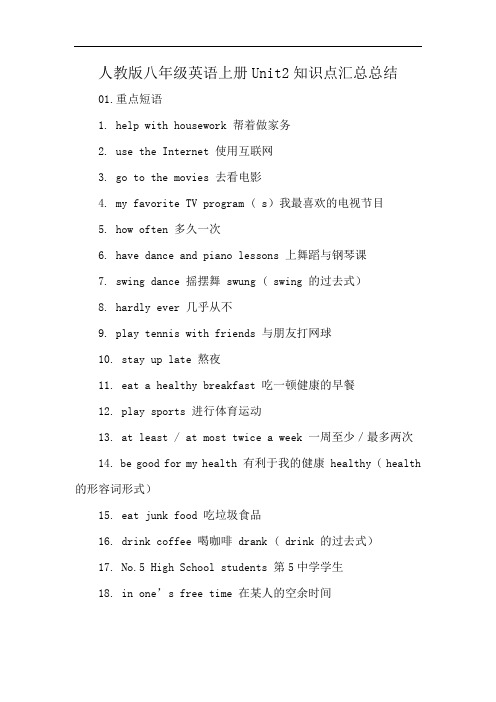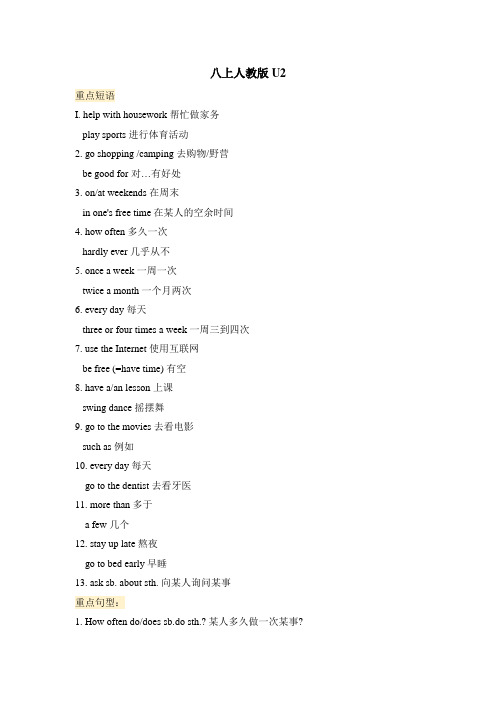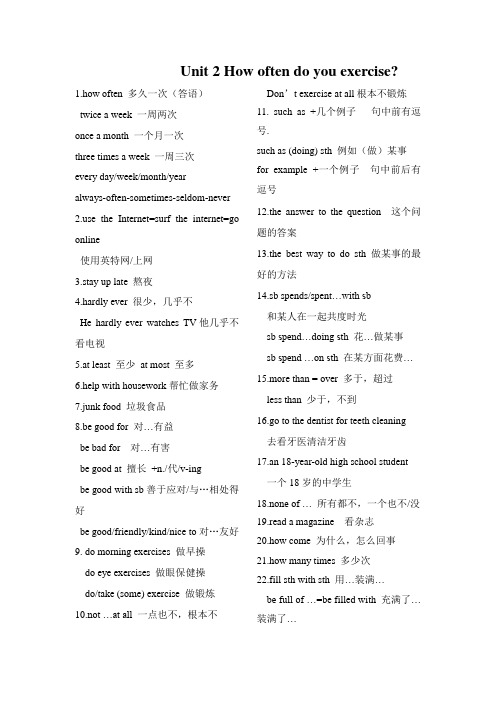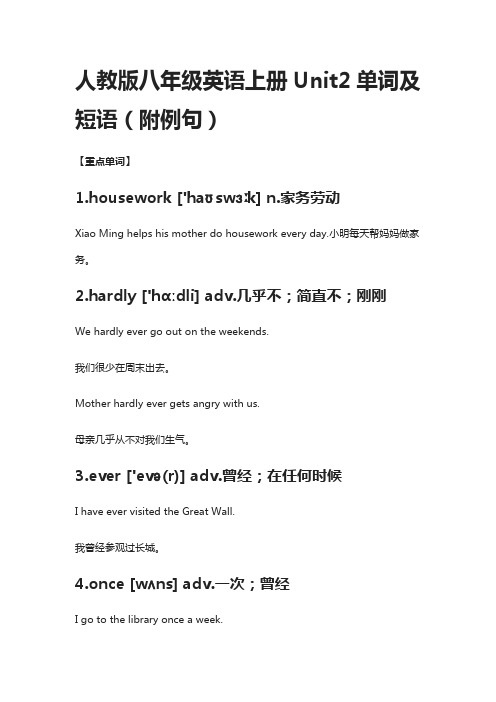人教版八年级上册第二单元unit2重点短语语法
人教版八年级英语上册Unit2知识点汇总总结

人教版八年级英语上册Unit2知识点汇总总结01.重点短语1. help with housework 帮着做家务2. use the Internet 使用互联网3. go to the movies 去看电影4. my favorite TV program ( s)我最喜欢的电视节目5. how often 多久一次6. have dance and piano lessons 上舞蹈与钢琴课7. swing dance 摇摆舞 swung ( swing 的过去式)8. hardly ever 几乎从不9. play tennis with friends 与朋友打网球10. stay up late 熬夜11. eat a healthy breakfast 吃一顿健康的早餐12. play sports 进行体育运动13. at least / at most twice a week 一周至少/最多两次14. be good for my health 有利于我的健康 healthy ( health 的形容词形式)15. eat junk food 吃垃圾食品16. drink coffee 喝咖啡 drank ( drink 的过去式)17. No.5 High School students 第5中学学生18. in one’s free time 在某人的空余时间19. ask them about their free time activities 询问他们关于他们的业余活动20. not … at all 根本不…21. go online 上网22. be surprised that ..感到惊讶23. use it for fun 为了取乐而使用它24. the answers to the questions 这些问题的答案25. one to three times a week 一周一到三次26. two percent of the students 2%的学生27. the best way to do sth.做某事的最好方式28. such as 例如29. spend time with your friends 与你的朋友共度时光spent ( spend 的过去式)30. spend time on sth./ in doing sth.花时间在某事上/做某事31. play together 一起玩32. watch TV for over 2 hours 看两个多小时电视33. go to the dentist 去看牙医34. a 16-year-old high school student 一名16岁的中学生35. have a lot of good habits 有许多好习惯36. more / less than two hours 多/少于两小时37. go to the dentist for teeth cleaning 去牙医处清洁牙齿38. go to the shopping center 去购物中心02.重点句子语法聚焦1. --What do you usually do on weekends?你在周末通常做什么?--I always exercise.我总是锻炼。
Unit2重点短语句型人教版八年级英语上册

八上人教版U2重点短语I. help with housework 帮忙做家务play sports 进行体育活动2. go shopping /camping 去购物/野营be good for 对…有好处3. on/at weekends 在周末in one's free time 在某人的空余时间4. how often 多久一次hardly ever 几乎从不5. once a week 一周一次twice a month 一个月两次6. every day 每天three or four times a week 一周三到四次7. use the Internet 使用互联网be free (=have time) 有空8. have a/an lesson 上课swing dance 摇摆舞9. go to the movies 去看电影such as 例如10. every day 每天go to the dentist 去看牙医11. more than 多于a few 几个12. stay up late 熬夜go to bed early 早睡13. ask sb. about sth. 向某人询问某事重点句型:1. How often do/does sb.do sth.? 某人多久做一次某事?2. What do/does sb.do on weekends? 某人在周末做什么?3. How about...? ...怎么样?4. Here are + 名词. 这是……5. What kind of...? 什么种类的…?6. help sb. with sth. = help sb.(to) do sth. 帮助某人做某事7. want sb. to do sth. 想要某人做某事8. (主语) finds (s) + that 从句……发现……9. It's + 形容词 + to do sth. 做某事是…的。
Unit 2重点短语词组 人教版英语八年级上册

Unit Two1.on weekends(美)=at weekends(英) 在周末2.go to the movies=go to the cinema=see a movie=see a film (去)看电影3.once a week 一周一次次数+a/an+天/月/年twice a week 一周两次once upon a time 从前at once 立刻,马上twice a month 每月两次how often 多久一次4.in+时间段…(时间)以后5.next week 下周6.be full of… 充满了….7.do eye exercises 做眼保健操do morning exercises 做早操8.take exercise=do/play sports 锻炼,做运动take medicine 吃药take meals 吃饭9.at least 至少,起码at most 最多10.be/keep/stay healthy 保持健康be/stay/keep in good healthy 保持良好的健康状态in good healthy 处于健康状态11.ask sb. about sth. 问某人某事12.not...at all 一点也不,根本不,完全不13.go online = use the Internet 上网,上线14.the best way to do sth. 做某事的最好的方式/方法15.get together 集合,聚会,联欢all together 一起,总共together with 和,连同16.more than=over 超过,多于less than 少于,不到17.junk food 垃圾食品18.such as 例如,像…一样19.swing dance 摇摆舞20.hardly ever 几乎不21.be excited about 对…感到激动be surprised at 对…感到好奇be angry with sb. 生某人的气be proud of 因…而骄傲22.help with housework 帮组做家务Can’t/couldn’t help doing sth. 情不自禁的做某事,忍不住做某事do housework 做家务23.every day 每天e the Internet 上网go online去上网25.have dance and piano lessons 上舞蹈钢琴课26. swing dance 摇摆舞27. play tennis 打网球27. stay up late 熬夜28.go to bed early 早睡29.in one’s free time 在某人的空闲时间30.not...at all 根本不,一点也不31. the most popular 最流行的32. such as 例如33. go to the dentist 去看牙医teeth cleaning 牙齿清洁34.Old habits die hard. 旧习惯难改e the Internet 使用互联网use sth. to do sth. 使用某物做某事on the Internet 在互联网上36.How come? 为什么呢?怎么会呢?37.be good for 对…有益be good at 擅长…be good to 对…友好38.基数词+percent 百分之…39.the answer to our questions 我们问题的答案the key to the door 门上的钥匙40.人+spend+时间/金钱+on sth./(in) doing sth. 某人花费多少时间/金钱做某事物+cost sb.+金钱某物花费某人多少钱人+pay+钱+for+sth. 某人花了多少钱买某物It takes sb.+时间段+to do sth. 某人做某事花费了多少时间。
人教版英语八年级上册 unit2 重点短语和句型

Unit 2 How often do you exercise?1.how often 多久一次(答语)twice a week 一周两次once a month 一个月一次three times a week 一周三次every day/week/month/yearalways-often-sometimes-seldom-never e the Internet=surf the internet=go online使用英特网/上网3.stay up late 熬夜4.hardly ever 很少,几乎不He hardly ever watches TV他几乎不看电视5.at least 至少at most 至多6.help with housework帮忙做家务7.junk food 垃圾食品8.be good for 对…有益be bad for 对…有害be good at 擅长+n./代/v-ingbe good with sb善于应对/与…相处得好be good/friendly/kind/nice to对…友好9. do morning exercises 做早操do eye exercises 做眼保健操do/take (some) exercise 做锻炼10.not …at all 一点也不,根本不Don’t exercise at all根本不锻炼11. such as +几个例子句中前有逗号.such as (doing) sth 例如(做)某事for example +一个例子句中前后有逗号12.the answer to the question 这个问题的答案13.the best way to do sth 做某事的最好的方法14.sb spends/spent…with sb和某人在一起共度时光sb spend…doing sth 花…做某事sb spend …on sth 在某方面花费…15.more than = over 多于,超过less than 少于,不到16.go to the dentist for teeth cleaning去看牙医清洁牙齿17.an 18-year-old high school student一个18岁的中学生18.none of … 所有都不,一个也不/没19.read a magazine 看杂志20.how come 为什么,怎么回事21.how many times 多少次22.fill sth with sth 用…装满…be full of …=be filled with 充满了…装满了…23.favorite program 最喜爱的节目24.swing dance 摇摆舞25.want sb to do sth 想要某人做某事26.Here are the results 以下是结果27.as a result 结果(是)the result of……的结果28.by doing sth 通过做某事29.go camping in the country 到乡村野营30.almost every day 几乎每天31.Old habits die hard 旧习难改32.start doing sth =start to do sth 开始做…33.be healthy for the mind and the body 对身心是很健康的34.be (just) like … 就像…,正好像…35.help with sth. “帮助做某事”。
人教版八年级英语上册Unit2单词及短语(附例句)

人教版八年级英语上册Unit2单词及短语(附例句)【重点单词】1.housework ['haʊswɜːk] n.家务劳动Xiao Ming helps his mother do housework every day.小明每天帮妈妈做家务。
2.hardly ['hɑːdli] adv.几乎不;简直不;刚刚We hardly ever go out on the weekends.我们很少在周末出去。
Mother hardly ever gets angry with us.母亲几乎从不对我们生气。
3.ever ['evə(r)] adv.曾经;在任何时候I have ever visited the Great Wall.我曾经参观过长城。
4.once [wʌns] adv.一次;曾经I go to the library once a week.我每周去一次图书馆。
5.twice [twaɪs] adv.两倍;两次You can't go to the same place twice.你不可能两次去同一个地方。
6.Internet ['ɪntənet] n.因特网We can get a lot of information from the Internet.我们可以从互联网上得到很多信息。
7.program ['prəʊɡræm] n.节目;程序;课程;节目单This TV program is the best of all.这个电视节目是所有节目中最好的。
This TV program is much better than that one这个电视节目比那个好得多8.full [fʊl] adj.满的;充满的;完全的The bottle is full of milk.瓶子里装满了牛奶。
9.swing [swɪŋ] n.摇摆;秋千v.摇摆;旋转The little sister is swing with her friends.小妹妹正在和她的朋友们荡秋千。
初中英语 人教版八年级上册二第单元( 短语语法句型作文)

人教版八年级上册二第单元(短语语法句型作文)Unit 2 How often do you exercise?一.重点短语1.on weekends 在周末2.twice / three times a week 一周两/ 三次3.stay up late 熬夜4.swing dance 摇摆舞5.How come? 怎么会呢?6.go to the movies 去看电影7.hardly ever 几乎从不8.junk food 垃圾食品9.help with housework 帮忙做家务10.go shopping 去购物e the Internet 使用互联网12.read English books 阅读英文书籍13.favorite program 最喜欢的节目14.have piano lessons 上钢琴课15.drink milk 喝牛奶16.go to bed 上床睡觉17.eat a healthy breakfast 吃健康的早餐18.in the free time 在空闲时间19.ask sb. about sth. 询问某人关于某事20.at least 至少;不少于;起码21.be good for health 对健康有好处22.draw pictures 画画23.go online 上网24.go camping 去野营25.less than 少于26.go to the dentist 看牙医27.play computer games 玩电脑游戏28.play sports 做运动29.more than 多于30.such as 例如;像……这样31.... percent of the students 百分之……的学生32.the answer to the question 问题的答案33.want sb. to do sth. 想让某人做某事34.Old habits die hard. 旧习难改二.重点句型1. I go to the movies maybe once a month.我可能一个月看一次电影。
人教版初二英语八年级上册Unit2知识点
人教版初二英语八年级上册Unit2知识点Unit2 How often do you exercise?【重点语法】1. 频率副词: always,usually, often, sometimes, never频率副词在句中通常放在实义动词之前, be动词或助动词之后。
常用于一般现在时态中。
2.“次数”的表达方法一次once,两次twice,三次或三次以上:基数词+ times, 如:three times, five times,3. how often“多久一次”问频率,回答常含有频率词组或短语。
常见的how疑问词:1)How soon 多久(以后)—How soon will he be back?他多久能回来?—He will be back in amonth. 他一个月后能回来。
2)how long “多久”—How long did it take you toclean the house? 你打扫房子用了多久?—It took me half an hour to cleanthe house. 我打扫这房子用了半小时。
3)How many+名复How much+不可名“多少” 问数量(how much 还可问价格)【重点短语】1. go to the movies 去看电影2. look after = take care of 照顾3. surf the internet 上网4. healthy lifestyle 健康的生活方式5. go skate boarding 去划板6. keep healthy=stay healthy 保持健康7. eating habits 饮食习惯8. take more exercise 做更多的运动9. the same as 与什么相同10. be different from 不同11. once a month一月一次12. twice a week一周两次13. make a difference to 对......有影响/作用14. most of the students=moststudents15. shop=go shopping=do someshopping 购物16. be good for 对......有益17. be bad for 对......有害18. come home from school放学回家19. of course = certainly = sure 当然20. get good grades 取得好成绩21. keep/be in good health 保持健康22. take a vacation 去度假【词语辨析】1.maybe / may bemaybe 是副词,意为“大概,可能,或许”,一般用于句首。
人教版八年级英语上册Unit2重点短语和句型
Unit 2 How often do you exercise?重要短语:(1)help sb with sth 帮助某人做某事(19)go to bed early 上床睡觉早(2)go shopping 去买东西(20)play sports 做运动(3)on weekends 在周末(21)be good for 对….有好处(4)how often 多少次(22)be good at doing sth擅长做某事(5)hardly ever几乎从不(23)go camping去野营(6)once a week 一星期一次(24)in one’s free time 在某人的业余时间里(7)twice a month 一个月两次(25)the most popular 最受欢迎的(8)go to the movies 去看电影(26)such as 例如….像….这样(9)every day 每天(27)go to the dentist看牙科医生(10)use the Internet上网(28)more than 多于(11)be free=be not busy=have time 有空(29)old habits lie hard 旧习难改(12)have dance and piano lessons (30)less than 少于上舞蹈和钢琴课(31)junk food垃圾食品(13)swing dance 摇摆舞(32)take care of sb 照料某人(14)play tennis 打乒乓球(33)look after sb照顾某人(15)stay up late熬夜到很晚(34)have to do sth必须做某事(16)go to sleep 睡觉(35)get in…进入…(17)go to bed上床睡觉(36)be late for迟到(18)at least 至少,不少于,起码习惯用法:1. help sb. with sth=have sb do sth 帮助某人做某事2. How about doing…? ….怎么样?/ ….好不好?3. want sb. to do sth. 想让某人做某事4. How many + 可数名词复数+ 一般疑问句….有多少…..5. 主语+ find+ that 从句…发现…6. It’s + adj.+ to do sth. 做某事是….的7. spend time with sb. 和某人一起度过时光8. ask sb. about sth. 向某人询问某事9. by doing sth. 通过做某事10. What’s your favorite…..? 你最喜欢的……是什么?11 start doing sth. 开始做某事12. the best way to do sth. 做某事的最好方式13.full of满的14.what about doing sth?做某事怎么样?15.not….at all 一点儿也不I don`t like it at all. 我一点儿也不喜欢它。
人教版英语八年级上册第二单元短语语法知识点总结
Unit 2 How often do you exercise?一、片語、短語:01、help with housework 幫助做家務活,02、go shopping 購物,03、on weekends 在週末,04、how often 多久一次,05、hardly ever幾乎不,06、once a week 每週一次,07、twice a month每月二次,08、go to the movies去看電影,09、every day 每天,10、use the Internet上網/用網,11、be free有空,12、have dance and piano lessons 上舞蹈鋼琴課,13、swing dance搖擺舞14、play tennis 打網球,15、stay up late熬夜,16、at least至少,17、go to bed early 早睡,18、play sports 鍛煉身體,19、be good for 對…有好處,20、go camping去野營,21、in one’s free time 在某人の空閒時間,22、not….at all 根本不,23、the most popular 最流行,24、such as例如,25、go to the dentist去看牙醫,26、more than 超過/多於,27、Old habits die hard.舊習慣難改。
28、hard=difficult 困難の,29、less than 少於/不到二、重要句子(語法):What do you usually do on weekends?你週末通常做什麼?I always exercise.總是鍛煉身體。
What do they do on weekends?他們週末幹什麼?They often help with housework.他們經常幫助幹家務活。
What does she do on weekends? 她週末幹什麼?She sometimes goes shopping.她有時購物。
人教版英语八年级上册第二单元短语语法知识点总结
人教版英语八年级上册第二单元短语语法知识点总结Unit 2 How often do you exercise?一、词组、短语:01、XXX帮助做家务活,02、go shopping购物,03、on XXX在周末,04、how often多久一次,05、hardly ever几乎不,06、once a week每周一次,07、twice a month每月二次,08、go to the XXX去看电影,09、every day每天,10、use the Internet上网/用网,11、be free有空,12、have dance and piano lessons上舞蹈钢琴课,13、swing XXX摇摆舞14、play XXX打网球,15、stay up late熬夜,16、at least至少,二、重要句子(语法):What do you usually do on weekends?你周末通常做什么?What do they do on weekends?他们周末干什么?What does she do on weekends?她周末干什么?How often do you go to the movies?你多久看电影一次?I go to the movies maybe once a month.可能一个月看一次。
How often does he watch TV?他多久看电视一次?17、go to bed early早睡,18、play sports磨炼身材,19、be good for对…有好处,20、go camping去野营,21、in one’s free time在或人的闲暇工夫,22、not….at all基本不,23、the most popular最流行,24、such as例如,25、go to the dentist去看牙医,26、more than跨越/多于,27、Old habits die hard.旧惯难改。
- 1、下载文档前请自行甄别文档内容的完整性,平台不提供额外的编辑、内容补充、找答案等附加服务。
- 2、"仅部分预览"的文档,不可在线预览部分如存在完整性等问题,可反馈申请退款(可完整预览的文档不适用该条件!)。
- 3、如文档侵犯您的权益,请联系客服反馈,我们会尽快为您处理(人工客服工作时间:9:00-18:30)。
2. You________(禁止)copy others’ homework
3.His mother is ill, he __________(必须)go home.
4. You ________(必须)do your homework yourself.
She has a toothache.她牙痛。
(4)“部位+hurt(s)”。hurt是动词,意为“疼,痛”,其过去式仍为hurt,表达某一具
体位置的疼痛。
My head hurt s badly.我头疼得厉害。
(5)“(there is)someting wrong with+one's+部位”意为“某人……不舒服/出了毛病”。
其后接动词原形,无人称和数的变化。
You shouldn't go out at night.你不应该在夜里外出。
4. He shouldn’t eat anything他不应该吃东西
not...anything=nothing,因此此句还可表达为:He should eat nothing.
辨析:something与anything
5.She needs__________(学习)some Japanese.
6.Would you __________(介意) my sitting here?
1. I'm not feeling well.我感到不舒服。
(1)I’m not feeling well.(=I don't feel well.)是当自己身体感到不舒服时的常用语,常用来回答What’s the matter with you?“你怎么了?”
情态动词的位置:
情态动词在句中放在谓语动词之前,谓语动词前若有助动词,则在助动词之前,疑问句中,情态动词则在主语之前。
情态动词的特点:
情态动词无人称和数的变化,情态动词后面跟的动词需用原形,否定式构成是在情态动词后面加"not"。个别情态动词有现在式和过去式两种形式,过去式用来表达更加客气,委婉的语气,时态性不强,可用于过去,现在或将来。
2.hot tea with honey加蜂蜜的热茶
with在此句中是“有,带有”的意思,表示某物带有或具有某种特征。介词短语with honey作hot tea的后置定语。
a coat with four pockets有4个口袋的外套
a book with a blue cover一本蓝色封面的书
Cut it with a knife.用刀把它切开。
(3)意为“关于……,对于……,对……来说”,表示关系等。
Are you pleased with the result?你对这个结果满意吗?
3. Maybe you should see a dentist.也许你应该去看牙医。
should为情态动词,后接动词原形,其否定式为shouldn't,用来表示建议、要求等。
③lie也可以作名词,意为“说谎,谎言”,tell a lie/tell lies意为“说谎”。
The whole story is nothing but a pack of lies.整个叙述只不过是一派谎言。
(2)rest在此处用作动词,意为“休息”。
P1ease sit down and rest for a minute.请坐下来休息一会儿。
误:—How long have you caught a cold?—I have caught a cold for five days.
4.I have a stomachache.我胃痛。
这是患病或身体某部位不舒服的一种表达方法。在英语中,表达“疼痛或不舒服”
时常用的几个词有ache,sore,pain和hurt等。其用法总结如下:
拓展
lie还有其他一些用法:
①动词,意为“位于”,其现在分词、过去式、过去分词分别是1ylng,lay,lain。
China lies in the east of Asia.中国位于亚洲东部。
②动词,意为“说谎”,其现在分词、过去式、过去分词分别是lying,lied,lled。
She lied to us about her job.她就她的工作向我们撒了谎。
教师:唐美美学生:年级:初二科目:英语
时间: 2013年7月日课次:
1、教学目的与考点分析
1.单词短语。
2.会简单地询问身体状况
3.重点句型
教学内容及步骤
一.重点句:
1. Give advice提出建议
advice是不可数名词,意为“建议,忠告,劝告”。常用短语有:
give sb.advice给某人提建议take one's advice接受某人的建议listen to one's advice听从某人的建议ask for one's advice征求某人的建议
He often gives us some good advice.他经常给我们提出一些好的建议。
注意
表示“一条建议”时应说a piece of advice,而不能说an advice;“一些建议”最some advice。
2. What’s the matter?怎么了?
(1)这是询问病人病情时最常用的问句,意为“怎么了?”,通常与介词with连用。
注意
have a cold和catch a cold都可用来表示“伤风,感冒”,catch a cold侧重患感冒的动作,属于短暂的动作,不能与how lo ng和for及since引起的时间状语连用。
“你感冒多长时间了?”“我感冒5天了。”
正:—How long have you had a cold?—I have had a cold for five days。
You must do the work with more care.你工作一定要再细心些。
拓展
with作介词,用法很多,常见的还有:
(1)意为“和……一起”,表示伴随。
I 1ike to talk freely with my friends.我喜欢和朋友们一起自由交谈。
(2)意为“用……”,表示使用“某种工具、手段”等。
(2)sore常指因发炎而引起的肌肉疼,在表示自身的某部位疼痛时,常置于身体部位的名词之前。
have a sore back背疼have a sore throat喉咙疼
1. lie down and rest躺下休息
(1)liev.意为“躺,平卧”。
Don't lie down on the ground.不要躺在地上。
情态动词的用法:
1.can (could)表示说话人能,可以,同意,准许,以及
客观条件许可,could为can的过去式。
2.may表示许可,常用于句式“May I …….?”,回答多为Yes, you can./Sure.
2.must必须,应该,一定,准是,表示说话人认为有必要做某事,命令,要求别人做某事以及对事物的推测。
拓展
①rest用作名词,意为“休息”。常用于短语take/have a(good)rest(好好)
休息。
You are tired.You must have a rest.你累了,你必须休息一下。
②rest还可作“ 其余”讲,the rest of意为“其余的……”。
The rest of the students are boys.其余的学生是男生。
情态动词是一种本身有一定的词义,表示说话人的情绪,态度或语气的动词,但不能单独作谓语,只能和其他动词原形构成谓语。
情态动词数量不多,但用途广泛,主要有下列:
can (could), may (might), must, need, ought to, dare (dared), shall (should), will (would) .
Would you 1ike somethlng to drink?你想喝点东西吗?
情态动词
1.should情态动词,意为: “应该,应当”后接动词原型,常用来表示劝告或建议.
A: I have a headache.
B: You should lie down and rest.
有关情态动词的知识讲解
(1)二者均属于不定代词,指代某物。
(2)s omething通常用于肯定句中;anything则通常用于否定句和疑问句中。
I have something important to tell you.我有一些重要的事情告诉你。
I don't like anything.我什么也不喜欢。
(3)在表示委婉的邀请、请求、建议或希望得到肯定答复时常用something。[来源:]
4.will (would)决心,愿望。would为will的过去式,
will, would用于疑问句表示说话人向对方提出请求或询问,用would比will更婉转,客气。
5.Shall, should表示命令,警告,允诺,征求,劝告,建议惊奇。
随堂练习:1.----Must I go shopping?
must引导的问句的否定回答要用needn’t或don’t have to.意为“不必”。mustn’t意为“禁止”
must用来指一般现在时和一般将来时,过去式可用have to的过去式代替。
must和have to的区别: must表示说话人的主观思想, have to表示客观需要。
3.need是一个情态动词,他的用法完全和其他情态动词一样,但need还可当作实义动词使用,这时need就象其他动词一样,有第三人称,单复数,后面加带to的动词等特性。
